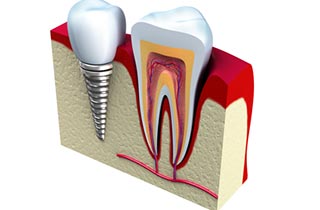Dental implants are one of the most commonly used solutions for replacing missing teeth, but they are not always the best choice in every case. The recommendation depends on the individual situation. They are stable, look natural, and can give you back the feeling of your own teeth. But the question almost always arises: How long does such an implant really last? There is no simple answer. Because no patient is like another – and just as no implant is like the next. Whether it lasts for many years depends on several things: the material, the experience of the dentist, and, crucially, how you yourself handle it in everyday life. This article is aimed at everyone who is considering dental implants or already has implants and wants to know how long they can be expected to last, which factors influence their durability, and how to properly care for the implant to achieve long-term success.
From our article, you can learn the following:

- What is the downside to dental implants?
- What happens to dental implants after 20 years? Will they last a lifetime?
- What happens if the implant falls out after the implantation?
What is the downside to dental implants?
While dental implants offer many benefits, there are also some downsides and potential risks to consider:
- High initial cost: Dental implants can be expensive compared to other tooth replacement options.
- Surgical procedure required: Involves surgery, which carries risks like infection or nerve damage.
- Long healing time: Full integration can take several months before the final crown is placed.
- Not suitable for everyone: Requires sufficient bone density and good overall health.
- Possible complications: Risk of implant failure, especially in smokers or patients with certain conditions.
- Additional procedures: Bone grafting or sinus lifts may be needed before placement.
Read more about dental implants pros and cons, and the possible problems with dental implants
What factors influence the long lifespan of implants?
We can say that the success of the implantation fundamentally depends on three things:
- Quality of the implant. Read more about different types of dental implants
- Knowledge of the doctor
- Other circumstances and diligence of the patient
How should we choose – and which implant?
There are about 220 types of implants on the market, it is worth not choosing based solely on price. Dr. med. dent. Zoltán Pollacsek recommends that you listen to your dentist and choose the type that he suggests. In the upper mid-range category, there are some that are of appealing quality. Since the implants are made of titanium, rejections or allergic reactions need not be feared. Implants of low-quality standards can cause problems more easily under unfavorable conditions. Therefore, when selecting, attention should be paid to the recommendation of your dentist and not just the price.
What happens to dental implants after 20 years? Will they last a lifetime?
Dental implants are designed as a long-term solution and can last 20 years or longer with proper care – some, particularly implant superstructures, can even last a lifetime. After 20 years, the implant post (the titanium root) may still be intact and functional with good bone health and oral hygiene, but a crown (the prosthetic tooth) may need to be replaced due to wear – usually after 10–15 years.
How should we care for the placed implants to make them long-lasting?
As mentioned before, the patient’s attitude is very important. In this chapter, we provide practical tips: Dental care requires great care even after implantation, as insufficient oral hygiene can cause inflammation and thus the implant can become loose. After the procedure, patients are taught how to brush their teeth and shown how to use the various oral hygiene devices for dentures. We also recommend regular check-ups. The denture built on the implant behaves in a certain way in the mouth similarly to natural teeth and therefore the following points are recommended again:
- Thorough tooth brushing
- Daily cleaning of the interdental spaces
- Semi-annual check-up visits
- Smoking cessation
What happens if the implant falls out after the implantation?
Don’t be afraid: This only happens in a small percentage of properly prepared implantations. If for some reason the body does not react well to the implant, it can happen that an inflammation occurs in the affected area and the removal of the implant may be necessary. The risk of implant failure can be significantly reduced by careful aftercare. Studies show that regular check-ups and good oral care are crucial. Once the affected bone has healed, the possibility of re-implantation arises.
In some cases, the process can be time-consuming and costly, especially with complicated prerequisites. But most patients benefit from a well-planned treatment. We see, a successful denture is not a dream and the investment of money, energy, and care pays off. An implant can help improve the quality of life, particularly regarding chewing and smiling, but alternative solutions can also be satisfactory depending on the patient.
When or how often does a dental implant need to be replaced?
A dental implant generally does not need to be replaced often – in many cases, never. However, different parts of the implant have different lifespans. More about Repairs of Dental Implants and Dental Implants Pros and Cons


